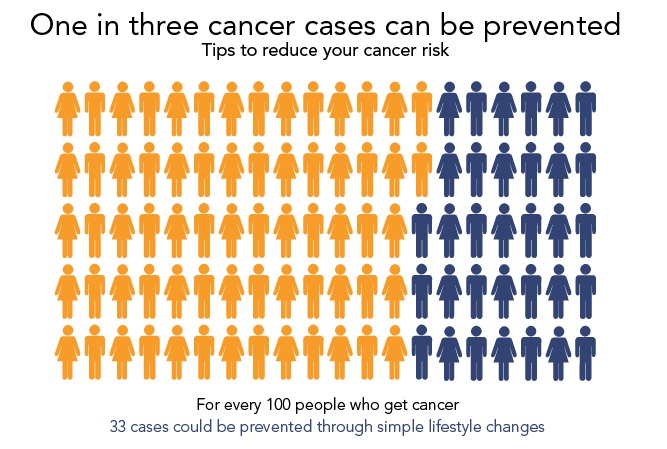Last week, yet another independent scientific study added to the robust evidence that following AICR’s 10 Recommendations for Cancer Prevention is powerfully protective against a great many diseases and conditions, not simply cancer alone.
This latest study found that childhood cancer survivors who follow more of our Recommendations are less likely to develop metabolic syndrome, a group of risk factors that raises the risk for heart disease and other health problems. We wrote about this new study in this week’s Cancer Research Update, our biweekly email newsletter on breaking cancer news.
 Previous independent studies have shown that our Recommendations protect against breast cancer and prostate cancer, reduce risk for cancer death, help people live longer, and improve cancer survivors’ physical and mental health. This latest study is a welcome addition to the ever-growing evidence that our advice maximizes your chances for leading a long and healthy life.
Previous independent studies have shown that our Recommendations protect against breast cancer and prostate cancer, reduce risk for cancer death, help people live longer, and improve cancer survivors’ physical and mental health. This latest study is a welcome addition to the ever-growing evidence that our advice maximizes your chances for leading a long and healthy life.
But in a way, it just makes sense.
We didn’t arrive at our 10 Recommendations for Cancer Prevention by accident. They’re the result of a long, rigorous, exhaustively comprehensive and objective process of analysis. Our Expert Panel examined thousands of studies on diet, weight, physical activity and cancer risk to determine which factors were associated with lower — and higher — cancer risk. They also were mindful of the research on preventing other chronic diseases, and took great pains to ensure that our advice didn’t contradict that evidence.
In these new studies, researchers unaffiliated with AICR take our Recommendations and apply them to their own large populations of study subjects, and then gauge whether following our advice is associated with lower risk for many different conditions. It’s simply another way of looking at the lifestyle-disease link. As the findings come in, showing that the healthy overall lifestyle outlined in our Recommendations is in fact protective, it offers powerful confirmation of our evidence-base advice.
Each independent researcher who takes up our Recommendations to test them interprets these Recommendations in a slightly different way, still finding them to be protective. That makes it clearer than ever that this simple overall advice for everyday living protects against cancer, heart disease, diabetes and other chronic diseases:
1. Do what you can to get to, and stay a healthy weight;
2. Eat a diet high in a variety of plant foods and low in animal foods;
3. Get and stay active for at least 30 minutes, every day.
There’s nothing surprising in this advice: it’s what your grandmother used to call common sense. And now that there’s clear evidence that so many different diseases and conditions share common risk factors, following her common-sense advice offers your best bet for a long and healthy life.





